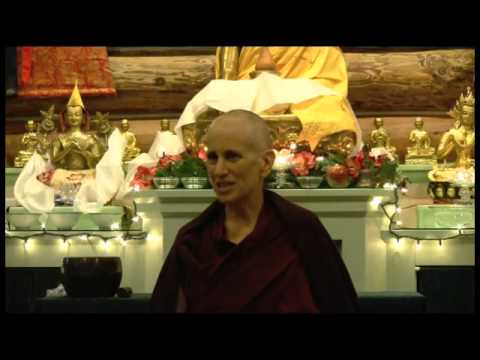Forebearance
Venerable Thubten Chodron explains the difference between patience and fortitude for the Bodhisattva's Breakfast Corner.
Venerable Tarpa asked me to talk about patience today. [laughter] That’s never a needed topic… But, you know, I’ve started to translate it now as fortitude, not patience. Because patience implies waiting and being passive. Something bad happens to you, and you’re patient, so you sit there. You’re passive, and you take it. You’re a good boy or a good girl; you don’t fight back and create problems.
But that’s not the real meaning of it. There are three kinds of fortitude. One is fortitude when confronted by adversity, when we’re being criticized and things like that. Another is fortitude when confronted by suffering, when we have physical and mental suffering. And the other is the fortitude to practice the Dharma. So, it isn’t just waiting or something. It isn’t just sitting there and smiling while someone is yelling at you. It’s actually building internal strength.
That’s why I think fortitude is a much better word. When there’s criticism, quarreling, negativity, we need a certain inner strength to endure the situation, don’t we? It’s not the endurance where we’re gritting our teeth or clenching our fists. It’s that we need to be strong to endure the situation; we need to have fortitude through it, so we don’t get knocked off this way or that way when there’s anger energy around us.
Similarly, with suffering we need to have internal strength. When we have mental and physical suffering, we need to have fortitude—the ability to be mentally strong—when that happens. For sure, mental and physical suffering are going to occur. For sure, we’re going to be around people who criticize us. Both of these things are part of samsara, aren’t they? Where are we going to go? Well, we’re working toward liberation, but until then we need fortitude.
And to practice the Dharma we also need fortitude because sometimes it’s hard; it’s difficult. Our mind gets discouraged, or especially when we study emptiness, we get a little freaked out and scared. So many different things come up when we’re learning the Dharma, and we realize what a deep change we need to make in the whole way our mind operates if we’re going to be happy.
To be able to see that honestly and not run away requires fortitude. So, I prefer translating it as fortitude and not patience. For me, patience really involves passivity, giving up. Whereas with fortitude, you’re making yourself strong. And we need that kind of inner strength. Bodhisattvas have to have incredible inner strength if they’re going to be of benefit to sentient beings. Because if every time someone crticizes us, if every time we struggle, if every time there’s difficulty in our practice we just freak out and dig ourselves a hole, then we’re not going to get anywhere.
We need to be able to have fortitude to continue, and to continue with a happy mind, not with a mind that says, “I ought to; I should; I’ve got to.” Rather, it’s saying, “This is an opportunity because usually I feel defeated by these kind of circumstances.” We are, aren’t we? Usually, we’re just totally overwhelmed and defeated: “Dharma is too hard,” “I’m too sick,” “I don’t want to think about Dharma,” or whatever it is.
With fortitude, we can pull ourselves out of that habitual response of feeling overwhelmed and giving up. With a happy mind, we can take the challenge that is being presented to us and use it and develop that inner strength.
Venerable Thubten Chodron
Venerable Chodron emphasizes the practical application of Buddha’s teachings in our daily lives and is especially skilled at explaining them in ways easily understood and practiced by Westerners. She is well known for her warm, humorous, and lucid teachings. She was ordained as a Buddhist nun in 1977 by Kyabje Ling Rinpoche in Dharamsala, India, and in 1986 she received bhikshuni (full) ordination in Taiwan. Read her full bio.


